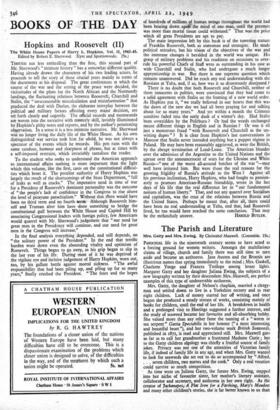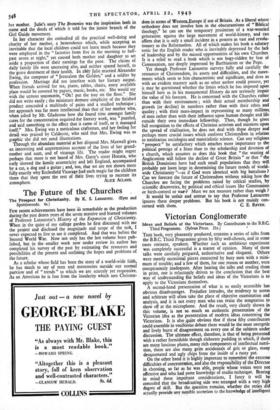The Parish and Literature
Mrs. Gatty and Mrs. Ewing. By Christabel Maxwell. (Constable. 15s.) PAROCHIAL life in the nineteenth century seems to have acted as a forcing ground for women writers. Amongst the multifarious claims of village, church and family there was still time to turn aside and become an authoress. Jane Austen and the Brontes are illustrious names that spring immediately to the mind ; Mrs. Gaskell, Charlotte Yonge and Frances Trollope among lesser lights. Margaret Gatty and her daughter Juliana Ewing, the subjects of a new biography written by their descendant Mrs. Maxwell, are perfect examples of this type of undeterrable authoress.
Mrs. Gatty, the daughter of Nelson's chaplain, married a clergy- man and settled down to live in a Yorkshire rectory and to rear eight children. Lack of money started her off writing, and once begun she produced a steady stream of works, consisting mainly of books for children, until the end of her life. A breakdown in health and a prolonged visit to Hastings suggested a further interest, and the study of seaweed became her favourite and all-absorbing hobby. She valued more than any other fame the naming of a " worm or sea serpent " Gattia Spectabilis in her honour ("a most interesting and beautiful beast "), and her two-volume work British Seaweeds, published in 1872, is read and appreciated still. Mrs. Maxwell goes so far as to call her grandmother a frustrated Madame Curie ; but to the Gatty children algology was chiefly a fruitful source of family jokes. Privacy was not one of the amenities of Victorian family life, if indeed of family life in any age, and when Mrs. Gatty wanted to look for seaweeds she set out to do so accompanied by " Alfred, . . . seven children, two nurses and the cook." Only a real vocation could survive so much competition.
As time went on Juliana Gatty, the future Mrs. Ewing, stepped into her niche of favourite sister, her mother's literary assistant, collaborator and secretary, and authoress in her own right. As the creator of jackanapes, A Flat Iron for a Farthing, Mary's Meadow and many other children's stories, she is far better known to us than
her mother. Julie's story The Brownies was the inspiration both in name and the deeds of which it told for the junior branch of the Girl Guide movement.
In her character she embodied all the practical well-doing and charity of her mother, a benevolence which, while accepting as inevitable that the local children could not learn much because they were employed in the " factories from five in the morning to half- past seven at night," yet caused both mother and daughter to set aside a proportion of their earnings for the poor. The claims of daily family life were unceasing also, and neither spared herself, to the grave detriment of their health. In 1867 Julie married Alexander Ewing, the composer of " Jerusalem the Golden," and a soldier by profession. Marriage did not interfere with her literary output. When friends arrived for tea, piano, tables, chairs, every available place would be covered by papers, music, books, etc. She would say with the utmost unconcern, " Oh! put the tray on the floor." She did not write easily ; the miniature demure simplicity of the finished product concealed a multitude of pains and a studied technique ; her approach was far more intellectual than that of her mother who, when asked by Mr. Gladstone how she found time amongst family cares for the concentration required for literary work, was " puzzled, and said something to the effect that it came of itself, or it managed itself." Mrs. Ewing was a meticulous craftsman, and her feeling for detail was praised by Caldecott, who said that Mrs. Ewing was so graphic she did not need illustrations. Through the abundant material at her disposal Mrs. Maxwell gives an interesting and unpretentious account of the lives of her grand- mother and aunt, and of vicarage life. The reader might regret perhaps that more is not heard of Mrs. Gatty's sister Horatia, who early showed the family eccentricity and left England, accompanied by a cat, a dog and a guitar ; and, too, that we are not shown more fully exactly why Ecclesfield Vicarage had such magic for the children there that they spent the rest of their lives trying to recreate its



































 Previous page
Previous page